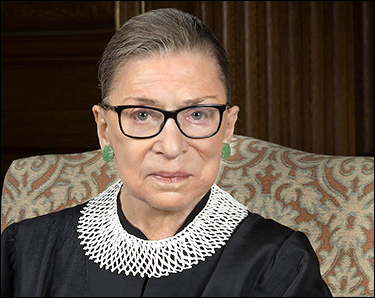By Jim Ellis
Sept. 22, 2020 — A secondary question surrounding the replacement process for the late Supreme Court Justice Ruth Bader Ginsburg is how will the confirmation fight over the next judicial nominee resonate in the 35 Senate races?In the 18 campaigns that appear non-competitive (9D; 8R) – for example, in Illinois (Sen. Dick Durbin-D), Rhode Island (Sen. Jack Reed-D), Arkansas (Sen. Tom Cotton-R), and Idaho (Sen. Jim Risch-R) to name a representative quartet – the Supreme Court battle will have little influence over the Senate outcome since those situations are virtually decided.
If the individual campaigns play the issue correctly, however, the Supreme Court vacancy development could be a boon to most competitive Republican incumbents and candidates in traditionally conservative states that are moving closer to the political center.
Democratic challengers in the more conservative states could have trouble because the issue matrix likely to be discussed through the nomination and confirmation process should activate the more conservative voting base. This is likely the case in the key competitive southern domains (AL, GA, NC), and in the Midwest and Rocky Mountain states, particularly in Iowa, the Kansas open seat, and for the Montana duel, in addition to the far west campaign in Alaska.
Perhaps the senator in the worst confirmation question situation, and one who can ill afford to be embroiled in such a predicament, is Maine Sen. Susan Collins (R). Already trailing in polling to state House Speaker Sara Gideon, Sen. Collins’ immediate call to postpone the process, and what will likely lead to a vote against the motion to proceed, will likely cost her conservative votes that she badly needs.
Her position to postpone has likely angered many who comprise the conservative base and gained her nothing with the Independents and soft Democrats that she desperately needs to close the gap between she and Gideon.




 March 25, 2020 — Gov. Greg Abbott (R), who moved the Texas run-off from May 26 to July 14 this past Friday night means that 16 federal contests – one Senate and 15 House races – will have a longer secondary campaign cycle. In Texas, if no candidate receives majority support in a partisan primary the top two finishers from the particular party advance to a runoff election.
March 25, 2020 — Gov. Greg Abbott (R), who moved the Texas run-off from May 26 to July 14 this past Friday night means that 16 federal contests – one Senate and 15 House races – will have a longer secondary campaign cycle. In Texas, if no candidate receives majority support in a partisan primary the top two finishers from the particular party advance to a runoff election. March 19, 2020 — The COVID-19 virus is causing obvious problems worldwide, and it’s changing the United States’ electoral system. Several states all with primaries on or before June 23 have already moved their date or are discussing such an option.
March 19, 2020 — The COVID-19 virus is causing obvious problems worldwide, and it’s changing the United States’ electoral system. Several states all with primaries on or before June 23 have already moved their date or are discussing such an option.